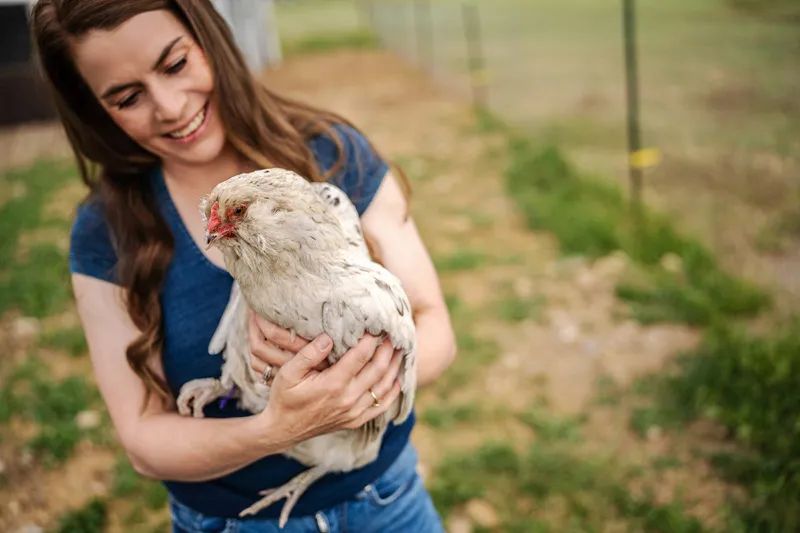
Laying a Rainbow
Meet Melissa Heiken and the Heritage Chickens of Opry Hill Farm
Visitors to Opry Hill Farm are welcomed by some big names. There’s Bob Dillon, Colonel James and Randy Rogers, all roosters who take turns patrolling the yard. Today it’s Randy’s turn and he takes his job seriously, strutting across the lawn with swagger. He is a flashy Silverudd Blue with a bright red comb, black tail feathers and a cocky stride. Randy knows he’s one handsome bird.
When he sees Melissa Heiken, Opry Hill’s owner, he steps into a run. Randy knows she probably has a treat or will at least offer a few compliments on his good looks. Melissa breeds chickens at her small farm near Laurel. The nine breeds she prefers, and the ones her customers favor too, lay colorful eggs. Their eggs range from pale blue to deep chocolate brown and moss green to pale pink.
“All of the breeds I offer are going to lay a pretty egg,” Melissa says. “That’s just my thing.”
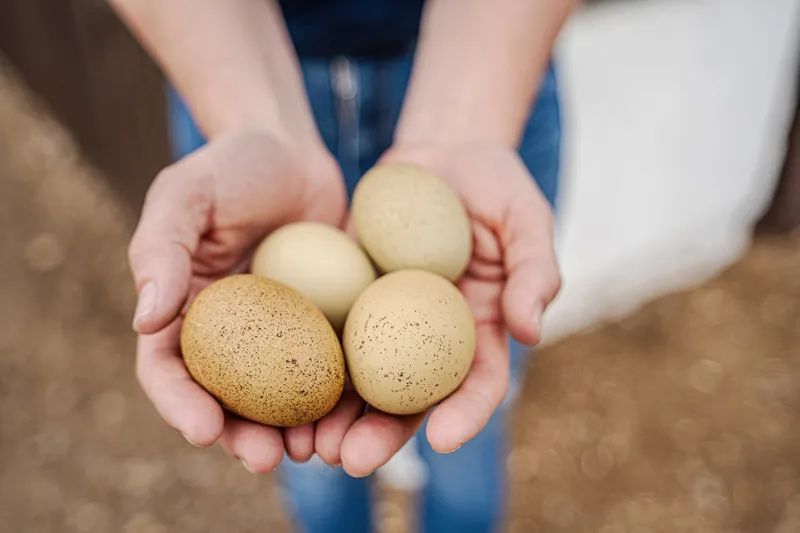
Her favorite breed, the Silverudd Blue, lays an egg that’s nearly the same color as mint chocolate chip ice cream. Silverudds are a rare heritage breed that do well in colder climates, and they’re known for their easygoing personality.
“They’re quirky, gentle and inquisitive,” Melissa says.
Melissa got her start in the in the business of chickens in 2019, when her husband handed her a Murray McMurray Hatchery catalog and gave her the green light to purchase a few chicks.
“I went all in,” Melissa says. “I started with six, which became 20, and by the end of the year I had 52.”
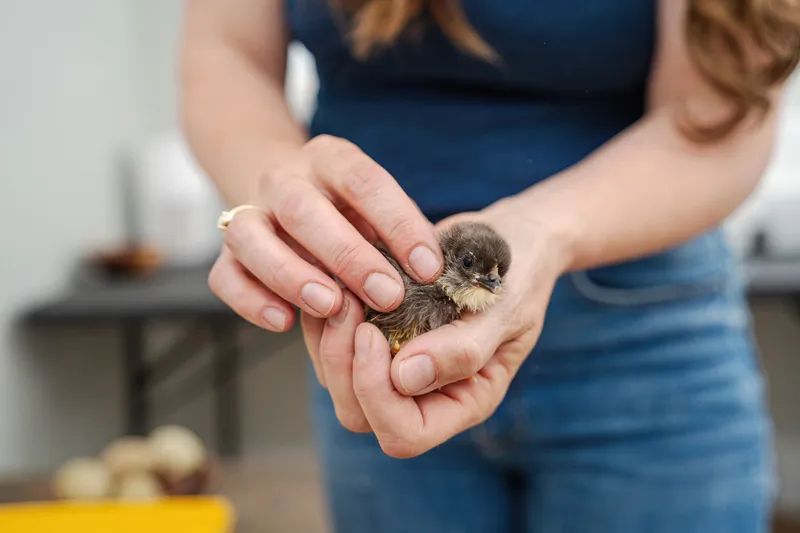
Her first batch of chicks were named after country-western singers, and she’s kept that tradition ever since. Melissa decided that first year that she wanted to sell chicks and launched a breeding program to focus on colored eggs.
She loves her chickens and can tell them all apart. Some have quirky waddle, others are fluffier or have a larger or smaller comb, or a peculiar twitch of their head.
“You go through your 20s and you’re looking for something to feed your soul, and then I got to my 30s and finally found what feeds my soul, and it’s chickens!” Melissa says.
Melissa is busiest from February through mid-June, when she is hatching chicks for delivery across the United States via the U.S. Postal Service. She has a small hatchery with five to 10 incubators set up in a spare bedroom in her home. The room is warm, tidy and quiet until Tuesdays, when the pipping starts first thing in the morning. By the time the day is over the small pens on the floor are filled with fluffy, noisy chicks.
In five to seven days, they’ll be shipped with a 72-hour heat pack, food and enough electrolytes to last them a few days in the mail.
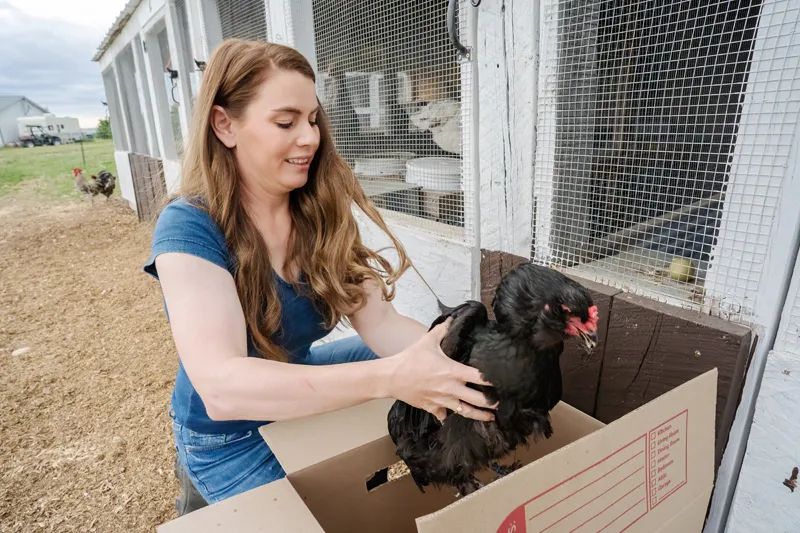
Many commercial hatcheries ship day-old chicks, but Melissa doesn’t like the risk of sending such young chicks through the mail. A few days can make a big difference, she says. Opry Hill also offers hatching eggs, which are shipped through the mail as well. For customers who only want laying hens, Melissa will also raise a limited number of chicks to an age when the males and females can be identified and sell females as feathered-out pullets.
All Opry Hill chicks are NPIP (Natural Poultry Improvement Plan) certified and Melissa’s flock is tested to be sure they are disease-free and cannot spread a variety of diseases including avian influenza and salmonella pullorum. It’s a voluntary program that adds another layer of protection for Melissa’s customers. To maintain the certification, Melissa adheres to strict bio-security protocols.
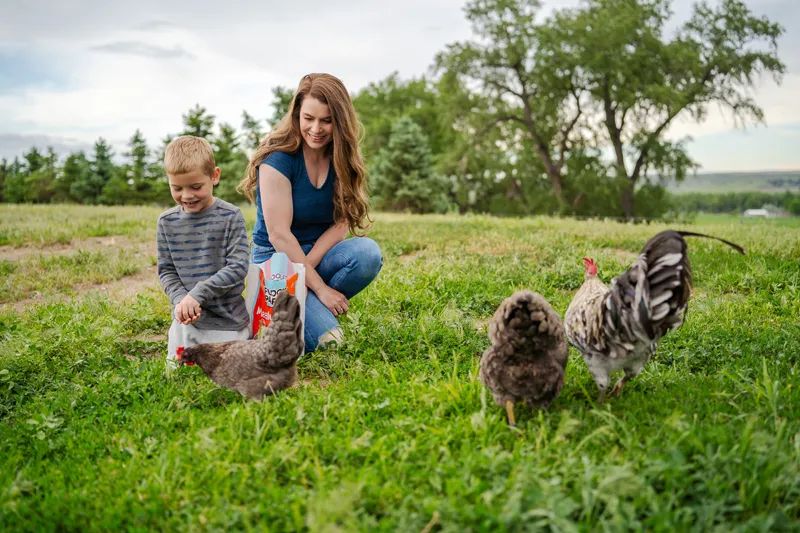
Melissa has nine breeding pens and a few experimental projects going all the time. She’s breeding for personality as well as a beautiful egg. That takes spending time in the pens getting to know each bird individually.
“They all have different personalities,” she says. “I only keep offspring from the really friendly ones.”
Melissa has become an Excel spreadsheet pro and keeps impeccable records.
“The genetics is just so fascinating to me,” she says.
It took four years and six generations to achieve the consistent color she’s looking for, and she has her chickens genetically tested at a lab in Florida to ensure their offspring will lay colored eggs.
Melissa leaves nothing to chance. Her flock is fed organic feed, and they’re on a feeding regimen that’s carefully tracked, which makes a difference in the quality of the eggs and chicks. All her birds are free-range at various times during the day.
“I believe it’s just a better quality of life,” Melissa says.
Despite the small size of her operation, Opry Hill’s colorful eggs stand out, thanks to Melissa’s online marketing efforts. She regularly posts on social media and has a bank of YouTube videos covering almost all aspects of chicken keeping and breeding. One of her first birds, Reba, a golden comet, became a viral celebrity on TikTok and clucked her way to more than 5 million views.
“If anyone really wants to get into it, I say pick a breed and go for it,” Melissa says.
Some of her marketing strategies have had to take a back seat while Melissa focuses her time on her 5-year-old and 6-month-old children.
“There’s a fine line between perfection and getting it done,” she says.
Chickens were the gateway to more farm projects. Melissa now also raises and breeds goats and keeps an ever-expanding garden. She has dreams of one day growing and selling lavender. With a marketing plan and some spread sheets, it won’t be long before she reaches her goal.
“If you want to be successful,” Melissa says, “you have to do what you love.”
TO KEEP TABS on Opry Hill Farm, visit them online at opryhill.com or follow the farm on social media at Facebook.com/opryhill or @opryhill on Instagram.











